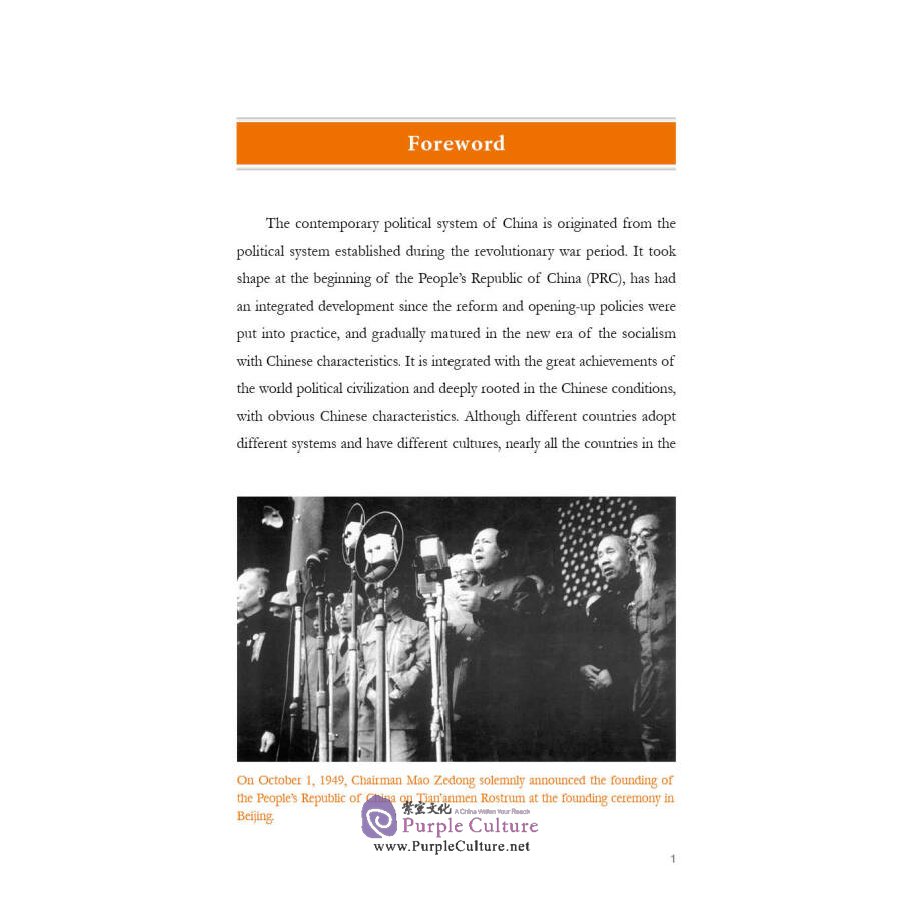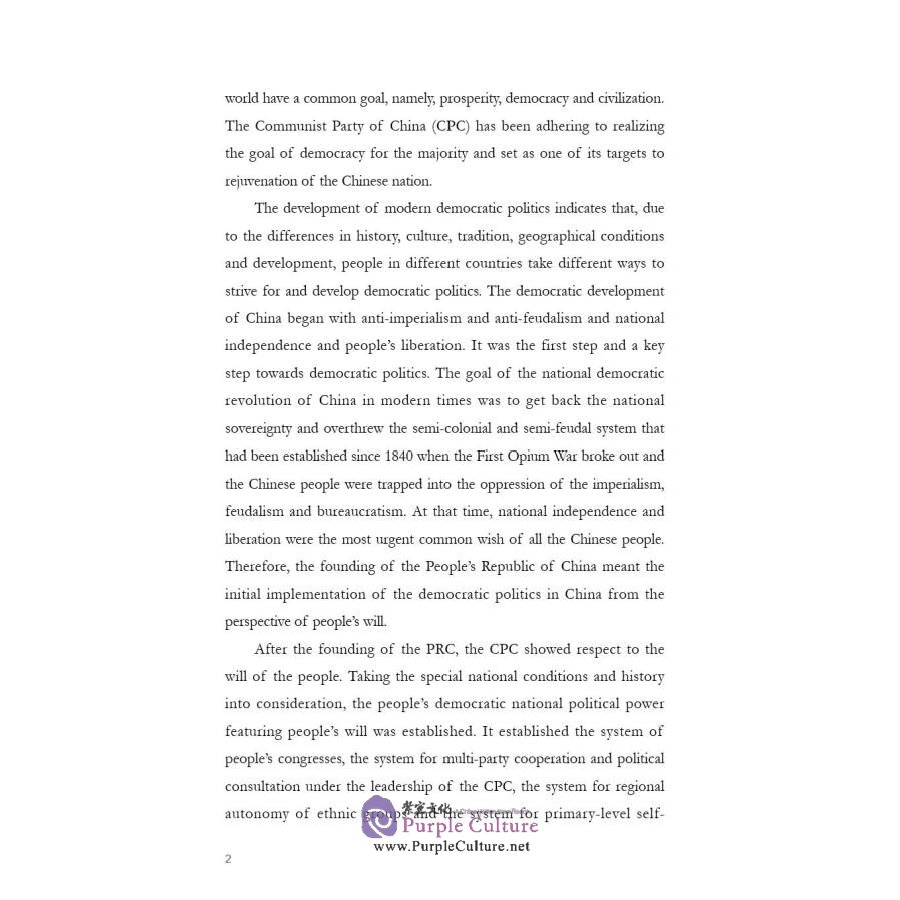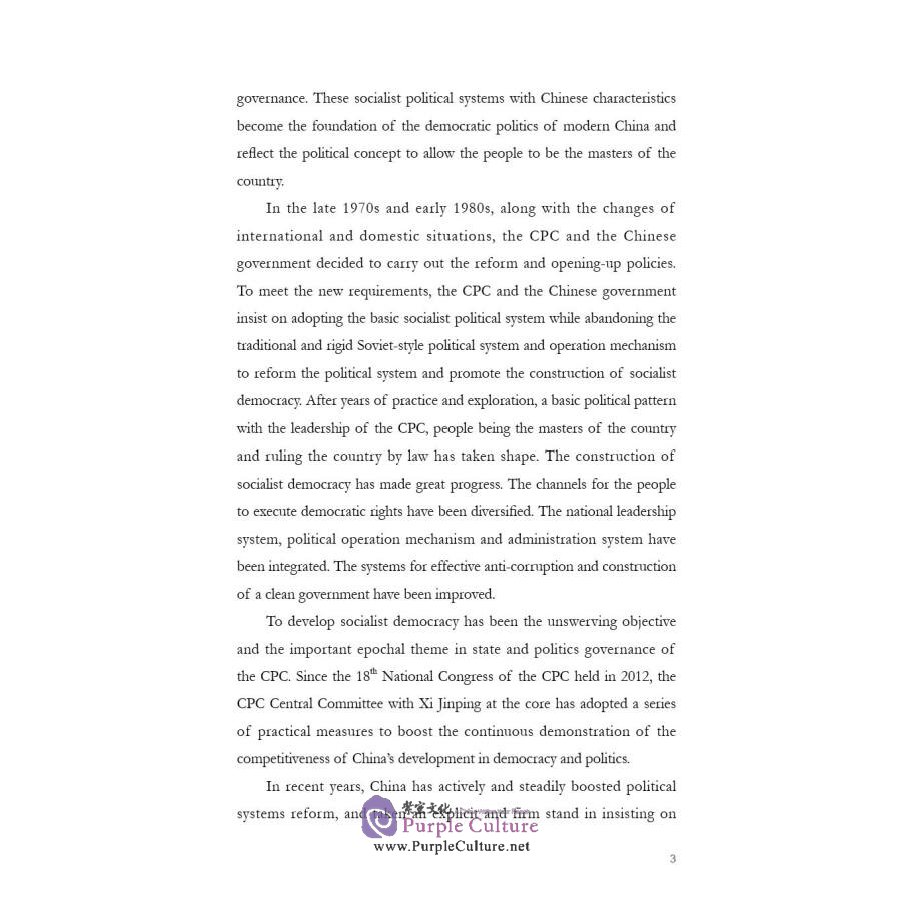The contemporary political system of China is originated from the political system established during the revolutionary war period. It took shape at the beginning of the People’s Republic of China (PRC), has had an integrated development since the reform and opening-up policies were put into practice, and gradually matured in the new era of the socialism with Chinese characteristics. It is integrated with the great achievements of the world political civilization and deeply rooted in the Chinese conditions, with obvious Chinese characteristics. Although different countries adopt different systems and have different cultures, nearly all the countries in the world have a common goal, namely, prosperity, democracy and civilization. The Communist Party of China (CPC) has been adhering to realizing the goal of democracy for the majority and set as one of its targets to rejuvenation of the Chinese nation.
The development of modern democratic politics indicates that, due to the differences in history, culture, tradition, geographical conditions and development, people in different countries take different ways to strive for and develop democratic politics. The democratic development of China began with anti-imperialism and anti-feudalism and national independence and people’s liberation. It was the first step and a key step towards democratic politics. The goal of the national democratic revolution of China in modern times was to get back the national sovereignty and overthrew the semi-colonial and semi-feudal system that had been established since 1840 when the First Opium War broke out and the Chinese people were trapped into the oppression of the imperialism, feudalism and bureaucratism. At that time, national independence and liberation were the most urgent common wish of all the Chinese people. Therefore, the founding of the People’s Republic of China meant the initial implementation of the democratic politics in China from the perspective of people's will.
After the founding of the PRC, the CPC showed respect to the will of the people. Taking the special national conditions and history into consideration, the people’s democratic national political power featuring people’s will was established. It established the system of people’s congresses, the system for multi-party cooperation and political consultation under the leadership of the CPC, the system for regional autonomy of ethnic groups and the system for primary-level self- governance. These socialist political systems with Chinese characteristics become the foundation of the democratic politics of modern China and reflect the political concept to allow the people to be the masters of the country.
In the late 1970s and early 1980s, along with the changes of international and domestic situations, the CPC and the Chinese government decided to carry out the reform and opening-up policies. To meet the new requirements, the CPC and the Chinese government insist on adopting the basic socialist political system while abandoning the traditional and rigid Soviet-style political system and operation mechanism to reform the political system and promote the construction of socialist democracy. After years of practice and exploration, a basic political pattern with the leadership of the CPC, people being the masters of the country and ruling the country by law has taken shape. The construction of socialist democracy has made great progress. The channels for the people to execute democratic rights have been diversified. The national leadership system, political operation mechanism and administration system have been integrated. The systems for effective anti-corruption and construction of a clean government have been improved.
To develop socialist democracy has been the unswerving objective and the important epochal theme in state and politics governance of the CPC. Since the 18th National Congress of the CPC held in 2012, the CPC Central Committee with Xi Jinping at the core has adopted a series of practical measures to boost the continuous demonstration of the competitiveness of China's development in democracy and politics.
In recent years, China has actively and steadily boosted political systems reform, and taken an explicit and firm stand in insisting on fundamental and basic political systems. The Party views the completion of power operation restriction and supervision system as important contents of political system’s reform and upholds the governance over power, issues and people with system. To strengthen the intra-Party, democratic, law and consensus supervision, the Party established National Supervisory Commission, covering all the civil servants. Such measures further expand and safeguard the political and democratic rights of the people and build a social environment with integrity and honesty.
The influence of the political development with Chinese characteristics is increasingly improving. Having upheld the principle of self-dominance and inclusiveness, the Party, with a more open mind and majestic spirit, has impressively established the Chinese democracy mode while absorbing the helpful achievements of humankind’s political civilization. Compared with the West, the most distinct advantage of Chinese political path is the leadership of the Party and the formation of the common faith, objective and action of all the people including members of democratic and independent parties. China’s political system features impressive characteristics, practical and evident impacts, efficient disposal of important issues collectively and great mobilization and enforcement power, maintains a constant and stable political situation, and continuous strategic planning.
The rapid development over the past decades fully proves that the democratic politics of socialism with Chinese characteristics selected by the Chinese people, not only enables them to realize the aspiration of being the country’s master and building of a prosperous, democratic, civilized, harmonious and beautiful country, but also contributes Chinese wisdom and plan to humankind’s political civilization. Today, more countries have started to not only appreciate but also study the Chinese political system and development path. Some western media have even reported that Chinese political mode is more efficient and successful than that of the West.



